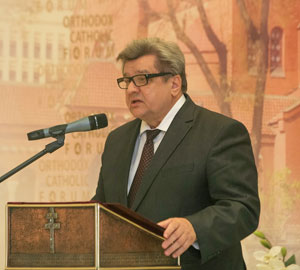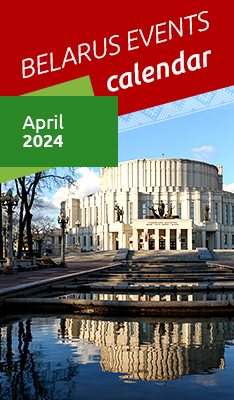Opinions & Interviews
Gulyako: No issues between different religious communities in Belarus

MINSK, 9 December (BelTA) – There are no interfaith issues in Belarus, Commissioner on Religious and Ethnic Affairs Leonid Gulyako told media before the international conference "Interethnic peace and tolerance – the major value of Eurasian integration", BelTA has learned.
Belarus is a multinational and multi-confessional state. According to Leonid Gulyako, Belarus is a comfortable home to representatives of all ethnicities living in the country (according to the 2009 population census there were 140 of them). Of 25 most popular religions in Belarus the Orthodoxy is the dominant one (about 84% of believers), Catholics believers account for 12.5%, the remaining denominations represent Lutherans, Jews, Muslims and others. "There is no reason to say that there are some problems because of religious affiliation among the Belarusians,” said Leonid Gulyako.
Leonid Gulyako called Kazakhstan, Belarus’ partner in the Customs Union and the durians Economic Union, as a shining example of harmonious interethnic and interreligious relations. The country has been building a unique model of intercultural and interethnic accord –The Assembly of the People which has no analogues in the world. In this regard, the experience of Kazakhstan can be of interest to other countries.
Ambassador Extraordinary and Plenipotentiary of the Republic of Kazakhstan to Belarus Yergali Bulegenov noted that since the first days of its independence, Kazakhstan has pursued a meaningful policy in the field of interethnic relations and tolerance, thanks to which the country has been living in peace. According to the diplomat, the experience of Kazakhstan is interesting not only for its Assembly of the People. For example, in 2003 Kazakhstan started holding the congress of leaders of the world and traditional religions. This experience showed that congresses are a good platform for a dialogue between representatives of all religions. Every time the number of the congress participants increases. The last Congress in 2012 was attended by delegates from 85 countries around the world, said the Ambassador.
The international conference in Minsk has been organized by the Institute of Philosophy of the National Academy of Sciences of Belarus (NASB) together with the Embassy of Kazakhstan in Belarus. The event is attended by the heads of the diplomatic missions of CIS countries and a number of other states, officials of the government bodies, NASB scholars and representatives institutions of higher learning of the country. The conference is expected to develop coordinated approaches to promote the ideas of tolerance and interethnic accord in the Eurasian space for peaceful coexistence, economic and social development and integration. These ideas are of particular importance as the Treaty on the Eurasian Economic Union comes into forces on 1 January 2015.
The conference focuses on the experience of Kazakhstan, Belarus and other countries of the Eurasian space in promoting peaceful interethnic and inter-confessional relations.
| Su | Mo | Tu | We | Th | Fr | Sa |
|---|---|---|---|---|---|---|







 print version
print version make home page
make home page add to bookmarks
add to bookmarks

